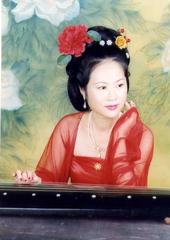About Wang Fei
Wang Fei is an international award winning artist, published writer, and accomplished musician who has toured internationally.
Wang Fei was professionally trained in literature, music and art since childhood and studied with several masters in these fields. Not only is she one of the few scholars who have truly mastered the qin and who can bring qin music to a wider audience, she is also one of the few qin performers who still maintain the qin in the traditional way as a scholarly art. Her elegant, graceful and peaceful style brings to her audiences the feeling of reading poems and enjoying Chinese landscape painting when they listen to her qin playing.
Wang Fei began her study of the guqin under Professor Li Xiangting at the Central Conservatory of Music in China in 1985. Master Li Xiangting regards Wang Fei as one of the most promising students he has ever had the opportunity to teach among his more than 500 students around the world.
She has won several awards in the field of Chinese music and has given concerts, numerous speeches, lectures, workshops and seminars on the guqin for many prestigious universities around the world as well as to the general public in China , the USA and Japan . She has written articles introducing the guqin to the public. Her music was included in an American textbook and CD on geography and music in 2003 to represent Chinese music. Not only is Wang Fei an outstanding guqin player, she also organizes and promotes guqin -related activities and events.
In recognition of her achievements in cultural exchange between China and other countries, she was made an Honorary Citizen of the City of Baltimore in 1993 and a Daughter of the City of Maoka , Japan in 1995. Over a hundred television, radio, magazine and newspaper journalists from China , the USA and Japan have interviewed her and written articles about her. Her biographical profile was included in the Chinese version of "World Who's Who" in 1998 and "World Class Chinese Intellectuals in the Musical And Artistic Fields" vol. 5.
Wang Fei is the founder and director of the North American Guqin Association (NAGA), a council member of the China Guqin Committee, and one of the youngest members of the qualifications committee and examiners for the national guqin grading examination in China .
Wang Fei is also a well-known author in China . She and her two sisters have been called the Chinese Brontë Sisters. Their book "Three Sisters' Skies and Dreams" was a bestseller in Beijing in 1997.
For more information or to listen to her guqin music online, please visit her web site at http://www.feiwang.com/ .
About the guqin
The guqin , a seven-stringed zither, is China 's oldest stringed instrument, with a history of some 3000 years. It has always been viewed as a symbol of Chinese high culture and the instrument most expressive of the essence of Chinese music. In Imperial China, a well educated scholar was expected to be skilled in four arts: qin (the guqin), qi (the game of Go), shu (calligraphy) and hua (painting). It became part of a tradition cultivated by the Chinese literati, and an instrument associated with philosophers, sages, and emperors.
Guqin music has its own notation, which itself has a history of at least 1500 years. There are over 150 guqin handbooks in existence, which contain in excess of 3,000 pieces of music as well as essays on the theoretical aspects of the instrument and its music.
When the U.S. spaceship “Voyager†was launched in 1977, a gold CD was placed on board to introduce the music of our planet to the rest of the universe. The guqin piece “Flowing water†was included to represent Chinese music.
Undoubtedly, the guqin is an important part of our world's heritage, but today few people can play this instrument, and it is rarely seen, even in China . In recognition of its supreme importance to Chinese culture, UNESCO in 2003 declared the art of the guqin a Masterpiece of the Oral and Intangible Heritage of Humanity.
For more information or to listen to guqin music online, please visit our web site at http://www.guqin.org .
